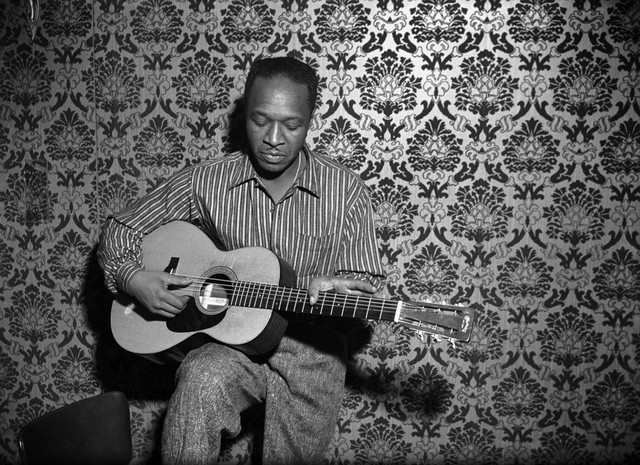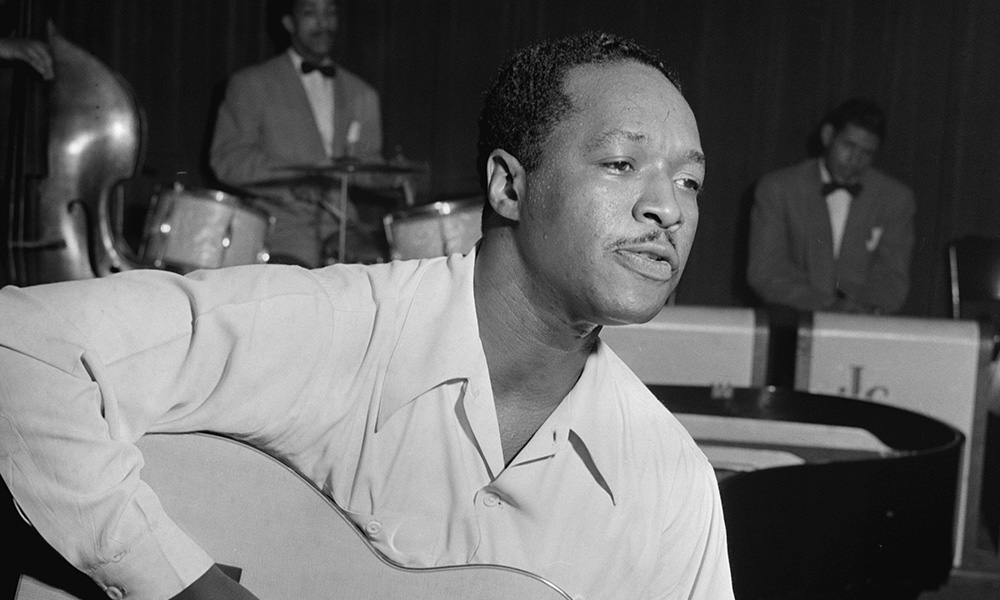This is the 8th in a series of articles about the Folk Americana Roots Hall of Fame’s (FARHOF) inaugural class of inductees. The first induction ceremonies will take place in April although an exact date has not yet been announced. This is the second article about a Solo Legacy inductee. A solo legacy artist is a performer whose initial impact on the genre was at least 45 years prior to the year of Induction.
One might be forgiven if the name Josh White is not immediately met with recognition. He was well known in the 1930s and 1940s but since his death in 1969, his fame has faded. Like many of the folk singers of those years, he became a victim of the McCarthy-era.
White recorded many hit songs during the 1940s that remain well known today. They were not original tunes but rather songs he reinvented with new words and music. “Waltzing Matilda” was a song he learned from an Australian sailor one night backstage at the Café Society. He changed the tune by using a waltz tempo and it became an immediate hit.
Other songs he brought to the American consciousness include “House Of The Rising Sun,” “John Henry,” “St. James Infirmary,” “Joshua Fit The Battle Of Jericho,” and “The Riddle Song (I Gave My Love A Cherry).” Other songs include “Strange Fruit” ( written by Abel Meeropol and originally recorded by Billie Holiday in 1939, protesting the lynching of Black Americans), “Jelly, Jelly” (a song with sexually charged lyrics), and “One Meatball.”
“One Meatball” was released as a single from the album Josh White Sings Easy. It tells the story of a man who has a mere fifteen cents to his name and is looking for something on a menu he can afford. When he orders one meatball, the waiter repeats the order loudly for all to hear thus embarrassing the man. “You gets no bread with one meatball,” the waiter loudly proclaims, a refrain that will continue to haunt the man.
Josh White could easily identify with the plight of the poor man in “One Meatball.” His early life reads like something out of a novel by Charles Dickens. He was born on February 11, 1914, in Greenville, SC. His father was a minister in addition to being a tailor and part time deliveryman, so his name was derived from the character Joshua in the Old Testament.
Parents Dennis and Daisy Elizabeth White were religious people and their children strictly reared. The only acceptable drinks were buttermilk, milk and water, church services were the only acceptable social events, and spirituals were the only acceptable music. Josh would later remember Christmas mornings when his father piled the entire family into his delivery wagon — his mother with her autoharp, Josh with a tambourine — and serenaded neighbors with carols and spirituals.
Tragedy struck in 1921 when Josh was seven. A tax collector came to the house and Mr. White invited the man inside. When the man failed to remove his hat, he was asked to remove it. The man refused and spit toward the fireplace. The wad of spit missed and landed on Mrs. White’s freshly scrubbed floor. Mr. White grabbed the man by the scruff of the neck and removed him from the family home.
A short time later, several deputies arrived. According to a Greenville news article in 2019 which recalled the event, the deputies “burst into the house, beat up Josh’s father, and dragged him through the streets to jail. Fighting all the way, he evidently landed a punch on the sheriff. Without a trial, he was ruled insane (a black man daring to attack a white policeman had to be crazy), and incarcerated in the state asylum in Columbia.” Dennis White died there nine years later.
His mother, in need of money to raise her six children, hired out seven-year-old Josh to Blind Man Arnold, a black street singer. Josh led Arnold across the South and collected coins after performances. Josh had to dress in rags and pass a cup for coins while Blind Arnold performed, something he found humiliating. He earned four dollars a week of which Arnold would send White’s mother half.
During this time, Josh developed a flair for showmanship by dancing, singing, and playing the tambourine in addition to collecting coins. He was so good that Arnold began to rent out his services to other blind singers, including Blind Blake, Willie Johnson, Blind Lemon Jefferson, Blind Joe Taggart, and Joe Walker.
Though he learned to play guitar from the musicians he served, he would recall those years with bitterness. The old men would keep him dressed in ragged shorts and shoeless. Josh had to sleep in cotton fields or in horse stables, often on an empty stomach, while his employer slept in a blacks only hotel.
J. Mayo Williams rescued Josh from servitude in 1928. Mayo was an A&R man for Paramount in Chicago. He allowed 14 year-old Josh to live with him for a time and attend school. He recorded several records during this time under the name of Josh White, the Singing Christian (for religious songs) and Pinewood Tom (for blues tunes).

Bad luck was not finished with him, however. In 1936, he cut his right hand and infection set in. He lost the feeling in his fingers and it took him several years to regain the use of the hand well enough to play guitar. He was able to become a top guitarist once again, although without doing the fast runs he was noted for previously.
Josh played at President Franklin Roosevelt’s Inauguration in 1941 and became his close advisor and confidant on African-American issues. He would also give a command performance at the White House the same year. He remained friends with Franklin and Eleanor Roosevelt throughout their lives.
As noted previously, he became a victim of the McCarthy witch-hunts. Josh was never a communist but he was a human rights activist. Whether it was the plight of African-Americans or the oppression of people behind the Iron Curtain, he was always willing to lend his voice to their cause.
White relocated to London during the early fifties when he was unable to get gigs in America. He spent the last decade and a half of his life performing in concert halls, nightclubs, and folk music venues and festivals around the world. The performances took place outside America with a few notable exceptions.
In 1963, President John F. Kennedy invited him to appear on the national CBS television’s civil rights special Dinner with the President. He performed at President Lyndon Johnson’s Inauguration in 1965. In his final years he would appear on television on The Merv Griffin Show and Hootenanny, among others.
Josh suffered declining health in his later years, perhaps as a result of nutritional deficiencies in his youth coupled with a lifetime of smoking cigarettes. He suffered several heart attacks, weakening it dramatically. So weak was his heart that his doctors felt his only option for survival was heart valve replacement, a new procedure at the time. The surgery failed and he died on September 5, 1969, at North Shore University Hospital in Manhasset, NY, aged 55.
Despite a decline in popularity in his later years, Josh White’s impact is extensive. Whether it was the jazz folk genre he pioneered or the blues, pop, country, or folk, his influence can be found in the work of numerous artists such as Pete Seeger, Merle Travis, Elvis Presley, Nat King Cole, the Clancy Brothers, Harry Belafonte, John Fogerty, and Richie Havens.
Next up – Pete Seeger

